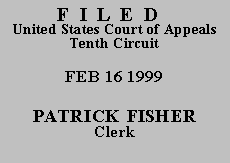

| UNITED STATES OF AMERICA,
v.
GEORGE VENTURA |
No. 98-3249
(D.C. No. 98-20004-01) (D. Kan.) |
BACKGROUND
Defendant-appellee George Ventura was charged with a single count of conspiracy to commit bank fraud, in violation of 18 U.S.C. §§ 371 and 1344(1), and five substantive counts of bank fraud, in violation of 18 U.S.C. § 1344(1), arising from a series of transactions between Ventura and Commercial State Bank ("CSB"), a federally-insured financial institution in Bonner Springs, Kansas. Ventura operated Mid-America Exotic Auto Sales, Inc. ("Mid-America"), of Overland Park, Kansas. Mid-America purchased and sold predominantly used luxury/exotic automobiles. To finance its purchases of automobiles for resale, Mid-America used a $750,000 line of credit established by Ventura at CSB. Ventura's line of credit was secured by the vehicles financed through the bank, parcels of real estate owned by Ventura, and the personal guarantees of Ventura and his wife.
The indictment alleged that Ventura and Robert Geekie, who operated a similar automobile business called Midwest Autohaus, Inc. ("Midwest") of Manteno, Illinois, engaged in a fraudulent scheme whereby Ventura and Geekie agreed to use Ventura's line of credit at CSB to finance the purchases of cars by Geekie's business. In essence, the government charged that, between January 1, 1994, and May 17, 1995, unbeknownst to CSB, over 500 transactions took place between Mid-America and Midwest, whereby Ventura "loaned" CSB funds to Geekie's company to finance Midwest's purchases. Geekie's company then repaid Ventura for these loans and Ventura in turn repaid CSB. Ventura maintained that Mid-America did not loan funds to Midwest, but rather, Mid-America actually purchased each vehicle from Midwest, and then resold it to Midwest shortly thereafter, such that the vehicles were basically consigned from Mid-America to Midwest.
A jury acquitted Ventura on the conspiracy count, but convicted him on the five substantive counts of bank fraud. The district court subsequently granted the defendant's motion for acquittal pursuant to Fed. R. Crim. P. 29. The government now appeals.
DISCUSSION
We review a district court decision setting aside a jury verdict and granting a judgment of acquittal de novo; such a decision is entitled to no deference on appeal. See United States v. Santistevan, 39 F.3d 250, 255 (10th Cir. 1994). The relevant inquiry is "whether, taken in the light most favorable to the government, there is substantial evidence from which a reasonable jury might properly find the defendant guilty beyond a reasonable doubt." United States v. Johnson, 911 F.2d 1394, 1399 (10th Cir. 1990); see also Santistevan, 39 F.3d at 255; United States v. White, 673 F.2d 299, 301 (10th Cir. 1982).
In order to convict Ventura of bank fraud under 18 U.S.C. § 1344(1)(1), the government was required to prove: (1) that Ventura knowingly executed or attempted to execute a scheme to defraud a federally insured financial institution; and (2) that Ventura did so with the intent to defraud.(2) See United States v. Rackley, 986 F.2d 1357, 1360 (10th Cir. 1993).
After careful review of the parties' briefs and the record before us, we are convinced that, even viewing the evidence in the light most favorable to the government and drawing all reasonable inferences in the government's favor, no reasonable jury could have found beyond a reasonable doubt that Ventura executed or attempted to execute, a scheme to defraud CSB, or that Ventura acted with specific intent to defraud the bank. Accordingly, we AFFIRM the judgment of acquittal based on insufficient evidence to sustain a bank fraud conviction for substantially the same reasons set forth in the district court's Memorandum and Order of August 13, 1998.
The mandate shall issue forthwith.
ENTERED FOR THE COURT
David M. Ebel
Circuit Judge
*.After examining the briefs and appellate record, this panel has determined unanimously to grant the parties' request for a decision on the briefs without oral argument. See Fed. R. App. P. 34(f) and 10th Cir. R. 34.1(G). The case is therefore ordered submitted without oral argument. This Order and Judgment is not binding precedent, except under the doctrines of law of the case, res judicata, and collateral estoppel. The court generally disfavors the citation of orders and judgments; nevertheless, an order and judgment may be cited under the terms and conditions of 10th Cir. R. 36.3.
1.18 U.S.C. § 1344 provides in relevant part:
Whoever knowingly executes, or attempts to execute, a scheme or artifice
(1) to defraud a financial institution;
shall be fined not more than $1,000,000 or imprisoned not more than 30 years, or both.
2.The parties stipulated to the fact that the financial institution involved was insured by the FDIC.